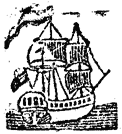“The Happy Peace Taking Place So Suddenly”
 According to an reminiscence by Dr. Ephraim Eliot, the Boston merchant Daniel Bell (1752-1791) and his brother-in-law, Dr. Amos Windship (1745-1813), conceived of a novel business venture early in 1783. Nantucket had oil from whaling. Britain had a good market for that oil. So why not send a shipload to England?
According to an reminiscence by Dr. Ephraim Eliot, the Boston merchant Daniel Bell (1752-1791) and his brother-in-law, Dr. Amos Windship (1745-1813), conceived of a novel business venture early in 1783. Nantucket had oil from whaling. Britain had a good market for that oil. So why not send a shipload to England?
Because, technically, Britain and America were still at war. Windship had even served in the medical departments of both the Continental Army and the Continental Navy, so he was well aware of that situation. But that didn’t deter him from signing onto this voyage as supercargo (a job that sounds a lot more exciting than it actually is).
Windship first went to New York, still held tight by the British military, and “obtained a private licence” for the trip. Somehow the partners arranged a deal with an American merchant in Amsterdam to extend credit for the venture, and with merchants in London to buy the oil.
But not “buy” in the usual way. According to Eliot’s account:
The ship with the Doctor on board, was to hover on the coast of England; to be taken by a british privateer & then claimed by the London partners. The Admirals protection [obtained in New York] was to screen him from all other captures.The Treaty of Paris ended the Revolutionary War in September 1783. British privateers returned to port, their licenses to take enemy shipping no longer valid. Which left Dr. Windship on his ship off the English coast, waiting for a capture that never came.
Unfortunately for the adventurers peace took place while he was on the ocean.
Windship decided that the best way to make a profit was “going immediately into the Thames & selling the oil,” perhaps for even more than originally planned. He didn’t consider that once Great Britain recognized the U.S. of A. as an independent country, American goods were subject to the same stiff Customs duties as other cargoes arriving in London from elsewhere outside the British Empire. And of course the local merchants who had made the previous, surreptitious deal weren’t going to expose that to the authorities.
The tariffs on the Nantucket oil “amounted to more than it was worth,” so the cargo and ship were seized and sold. But Bell still had to pay off that Dutch loan. He eventually applied for legal protection from creditors, pleading the unfortunate fact of “the happy Peace taking place so suddenly and unexpectedly.”
And this brings to an end “No Relation” Week at Boston 1775. So far I know, I’m not related to printer Robert Bell, deputy sheriff John Shubael Bell, any Sgt. Maj. Bell, bricklayer William Bell, or merchant Daniel Bell. And in some cases, that might be a very good thing.

1 comment:
As a member of the Bell family, let me say that your recent choice of subjects has been most enjoyable. Thank you.
Post a Comment